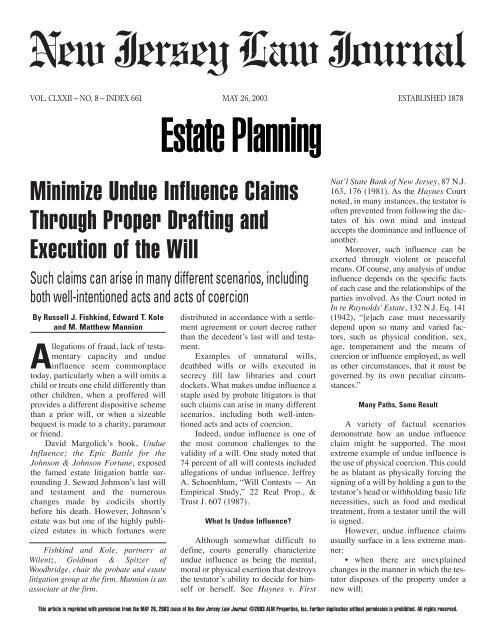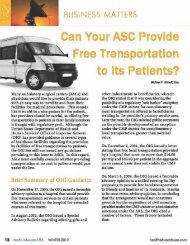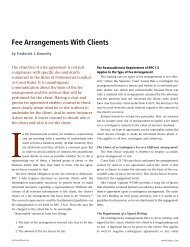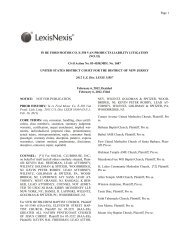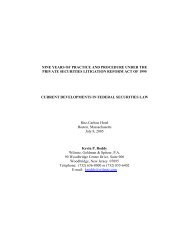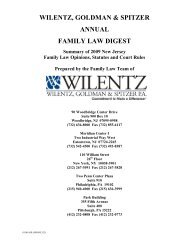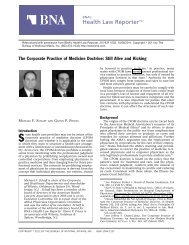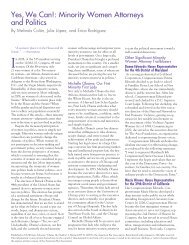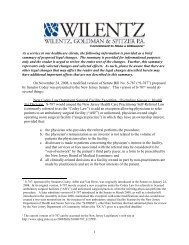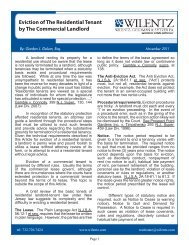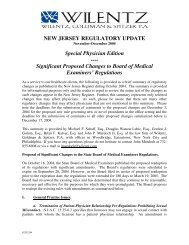Minimize Undue Influence Claims Through Proper Drafting and
Minimize Undue Influence Claims Through Proper Drafting and
Minimize Undue Influence Claims Through Proper Drafting and
- No tags were found...
Create successful ePaper yourself
Turn your PDF publications into a flip-book with our unique Google optimized e-Paper software.
VOL. CLXXII – NO. 8 – INDEX 661 MAY 26, 2003 ESTABLISHED 1878Estate Planning<strong>Minimize</strong> <strong>Undue</strong> <strong>Influence</strong> <strong>Claims</strong><strong>Through</strong> <strong>Proper</strong> <strong>Drafting</strong> <strong>and</strong>Execution of the WillSuch claims can arise in many different scenarios, includingboth well-intentioned acts <strong>and</strong> acts of coercionBy Russell J. Fishkind, Edward T. Kole<strong>and</strong> M. Matthew MannionAllegations of fraud, lack of testamentarycapacity <strong>and</strong> undueinfluence seem commonplacetoday, particularly when a will omits achild or treats one child differently thanother children, when a proffered willprovides a different dispositive schemethan a prior will, or when a sizeablebequest is made to a charity, paramouror friend.David Margolick’s book, <strong>Undue</strong><strong>Influence</strong>; the Epic Battle for theJohnson & Johnson Fortune, exposedthe famed estate litigation battle surroundingJ. Seward Johnson’s last will<strong>and</strong> testament <strong>and</strong> the numerouschanges made by codicils shortlybefore his death. However, Johnson’sestate was but one of the highly publicizedestates in which fortunes wereFishkind <strong>and</strong> Kole, partners atWilentz, Goldman & Spitzer ofWoodbridge, chair the probate <strong>and</strong> estatelitigation group at the firm. Mannion is anassociate at the firm.distributed in accordance with a settlementagreement or court decree ratherthan the decedent’s last will <strong>and</strong> testament.Examples of unnatural wills,deathbed wills or wills executed insecrecy fill law libraries <strong>and</strong> courtdockets. What makes undue influence astaple used by probate litigators is thatsuch claims can arise in many differentscenarios, including both well-intentionedacts <strong>and</strong> acts of coercion.Indeed, undue influence is one ofthe most common challenges to thevalidity of a will. One study noted that74 percent of all will contests includedallegations of undue influence. JeffreyA. Schoenblum, “Will Contests — AnEmpirical Study,” 22 Real Prop., &Trust J. 607 (1987).What Is <strong>Undue</strong> <strong>Influence</strong>?Although somewhat difficult todefine, courts generally characterizeundue influence as being the mental,moral or physical exertion that destroysthe testator’s ability to decide for himselfor herself. See Haynes v. FirstNat’l State Bank of New Jersey, 87 N.J.163, 176 (1981). As the Haynes Courtnoted, in many instances, the testator isoften prevented from following the dictatesof his own mind <strong>and</strong> insteadaccepts the dominance <strong>and</strong> influence ofanother.Moreover, such influence can beexerted through violent or peacefulmeans. Of course, any analysis of undueinfluence depends on the specific factsof each case <strong>and</strong> the relationships of theparties involved. As the Court noted inIn re Raynolds’ Estate, 132 N.J. Eq. 141(1942), “[e]ach case must necessarilydepend upon so many <strong>and</strong> varied factors,such as physical condition, sex,age, temperament <strong>and</strong> the means ofcoercion or influence employed, as wellas other circumstances, that it must begoverned by its own peculiar circumstances.”Many Paths, Same ResultA variety of factual scenariosdemonstrate how an undue influenceclaim might be supported. The mostextreme example of undue influence isthe use of physical coercion. This couldbe as blatant as physically forcing thesigning of a will by holding a gun to thetestator’s head or withholding basic lifenecessities, such as food <strong>and</strong> medicaltreatment, from a testator until the willis signed.However, undue influence claimsusually surface in a less extreme manner:• when there are unexplainedchanges in the manner in which the testatordisposes of the property under anew will;This article is reprinted with permission from the MAY 26, 2003 issue of the New Jersey Law Journal. ©2003 ALM <strong>Proper</strong>ties, Inc. Further duplication without permission is prohibited. All rights reserved.
2 NEW JERSEY LAW JOURNAL, MAY 26, 2003 172 N.J.L.J. 661• circumstances involving “unnatural”or “unjust” gifts;• when there is a heightened susceptibilityof the testator being influenced;• when the testator’s financial <strong>and</strong>business affairs are controlled by theinfluencer; <strong>and</strong>• when the length of the relationshipbetween the testator <strong>and</strong> thealleged influencer is questioned, suchas when the testator becomes involvedwith a new paramour. See 5 N.J.Practice (Clapp, Wills <strong>and</strong>Administration) §60 (3d. ed. 1962).Many times, undue influenceclaims arise when one of the beneficiariesof the will has a close, confidentialrelationship with the testator <strong>and</strong> thereare “suspicious circumstances” associatedwith that relationship. Accordingto Black’s Law Dictionary 294 (7th ed.1999), a confidential relationship is anassociation in which one person putstrust <strong>and</strong> confidence in another to act ingood faith for that person, such asbetween an attorney <strong>and</strong> his client or astockbroker <strong>and</strong> her clientThe attorney-client relationship(setting aside the ethical considerations)was specifically addressed by theCourt of Errors <strong>and</strong> Appeals in In reHeim’s Will, 136 N.J. Eq. 138, 158(1945), which refused to permit a willto be probated given that it appearedthat an attorney exercised undue influenceover the testator.In Heim, four months prior to hisdeath, the 90-year old testator decided tohave his attorney create a will for himwhile he was in the hospital. The testatortold his attorney to put himself as thebeneficiary of the will, stating withrespect to the members of his family that“[t]hose wolves have had enough.”Determining that the only proof torebut the claim of undue influence thatthe proponent of the will (the attorney)offered was essentially his own testimonywhich contained “inherent contradictions,”the Court found that “thetestimony produced to countervail thepresumption of undue influence wasneither impeccable nor convincingThe burden to disprove undue influence shiftsto the proponent of the will if the existenceof a confidential relationship <strong>and</strong> the presenceof suspicious circumstances is demonstrated.[<strong>and</strong>] [t]he proponent of the will didnot successfully carry his burden.”Several facts demonstrated theexistence of undue influence in theexecution of the will, including: theattorney/beneficiary had been h<strong>and</strong>lingcertain financial matters for the testator,that is, controlled his checkbook;the attorney/beneficiary had twoyounger attorneys from his law firm goto the hospital with him to have the testatorexecute the will while he lay ill inhis hospital bed; <strong>and</strong> there was evidencethat suggested that the testator’sability to fully comprehend what wasoccurring at the time of the will’s execution“had failed him.”Accordingly, the Court determinedthat there was sufficient evidence ofundue influence to set aside the lowercourt’s decision to allow the will to beprobated.Suspicious CircumstancesConfidential relationships can alsodevelop between paramours, friends,<strong>and</strong> parents <strong>and</strong> their children. It alldepends on the extent to which a personrelies upon another.Such a relationship occurs whenone person has influence or a superiorposition over the other as a result of theconfidence being placed in him by theperson in the dependent position,which, in this case is the testator. Thisconfidential relationship in <strong>and</strong> ofitself, however, is insufficient to establishundue influence. As the Haynescourt noted, in addition to a confidentialrelationship, suspicious circumstancesmust exist.Examples of what courts considerto be suspicious circumstances includewhen: one of the beneficiaries actuallydrafts the will; the alleged influencerorchestrates having the will drafted,chooses the drafter of <strong>and</strong> the witnessesto the will <strong>and</strong> is able to secure anextreme benefit for himself through thewill; or where the alleged influenceralso obtains a power of attorney to h<strong>and</strong>leall of the testator’s finances whilethe testator is still living.Situations where a testator mighthave been influenced by certain threatsmade by beneficiaries can also because for setting aside a will basedupon undue influence. See Lynch v.Clements, 24 N.J. Eq. 431 (Ch. 1874),<strong>and</strong> In re Sickles’ Will, 64 N.J. Eq. 791(1902).In Sickles, probate of the will wasdenied based upon undue influencebecause the 81-year old, bedridden <strong>and</strong>paralyzed testator was induced to makethe will in favor of a son <strong>and</strong> the son’swife with whom the testator lived as aresult of a threat that they would leavethe testator if the will was not made.Similarly, in Lynch, the Courtfound that a son had unduly influencedhis father in the making of the father’swill. The Court determined that thefather had been unduly influencedbecause the fatherwas afraid of [the son’s] power,as the holder of the mortgage onhis farm. He was enfeebled byage <strong>and</strong> disease. He knew his sonto be a hard <strong>and</strong> bad man, <strong>and</strong>made the will as he directed himto make it, in the vain hope, asmay well be inferred from the
172 N.J.L.J. 661 NEW JERSEY LAW JOURNAL, MAY 26, 2003 3evidence, that he might treat thefamily with leniency, <strong>and</strong> possiblytake care of the youngerbrother, whom he directed hisfather to disinherit.The Court dismissed the action by theson to enforce the will.Shifting BurdenAlthough the person claiming theexistence of undue influence bears theburden of proof, if he is able to demonstrateboth the existence of a confidentialrelationship <strong>and</strong> the presence ofsuspicious circumstances, the burdento disprove undue influence shifts tothe proponent of the will. See Haynes.Generally, the proponent’s burdenis to prove by a preponderance of theevidence that undue influence does notexist. See In re Weeks’ Estate, 29 N.J.Super. 533 (App. Div. 1954).Note, however, that mere appearanceof impropriety is insufficient tosustain the burden of proving undueinfluence. Any such appearance mustbe accompanied by fraudulent acts.As New Jersey courts recognize,<strong>and</strong> as the Court noted in In re Merkel’sWill, 4 N.J. Misc. 656, 661 (1926),“influence of affection <strong>and</strong> kindoffices, unconnected with fraud or contrivance,though it induces gratitude<strong>and</strong> testamentary recompense, it is notundue. … mere possession of influence<strong>and</strong> opportunity <strong>and</strong> motive to exerciseit affords no presumption of undueinfluence. It must appear either directly,or be justified from the facts proven,that the influence was exerted <strong>and</strong>operated to … coerce.”In In re Raynolds’ Estate, 132 N.J.Eq. 141 (1942), the Court chose todeny a claim of undue influencebecause, while it recognized that thewife in the case clearly exercised influenceover the testator husb<strong>and</strong>, theCourt did not find the influence to beundue.[f]or the purpose of argument, itmay be conceded that MadelineTaitt Raynolds brought all herpowers of persuasion to bearupon her husb<strong>and</strong> to induce himto prefer her own sons over herstepsons in the testamentary dispositionof his estate. And it maybe that the testamentary dispositionhere complained of resultedlargely from her entreaties <strong>and</strong>persuasions. But it does not followthat the influence thus exertedby her was undue. It was notundue unless his will was overcomeby hers; unless her willwas substituted for his; unless itappears that, without such substitution,a different dispositionof his estate would have beenmade by the testator; in short,unless it appears that the questioneddocument as her will, nothis. He may have submitted topersuasion <strong>and</strong> succumbed toentreaty, but if he was still freeto do otherwise, <strong>and</strong> if what hedid was in the exercise of hisfree will, even though inducedby persuasion <strong>and</strong> entreaty, itcannot be said to be the result ofundue influence.Accordingly, the burden of establishingan undue influence cannot be met simplyby demonstrating that someonepersuaded the testator to make certaindistributions — the persuasion must becoupled with conduct that rises to thelevel of fraud.Preventing <strong>Claims</strong><strong>Undue</strong> influence claims can beminimized through proper preparationin the drafting <strong>and</strong> execution of the will<strong>and</strong> through the manner in which thetestator makes his distribution of theproperty.In terms of the preparation <strong>and</strong> executionof the will, the Haynes Courtnoted that one of the initial ways to minimizethe risk of an undue influenceclaim is to ensure that the testatorobtains advice from an independentattorney.As described above, many timesthe perpetrator of the undue influencewill have his attorney prepare the testator’swill. Such circumstances enhancea claim that something untoward mayhave occurred. If, however, the testatorobtains separate, independent legalcounsel, the appearance of impropriety<strong>and</strong> potential conflicts of interest areminimized.The preparation of the will mayalso require the inclusion of a no contestclause that could chill the beneficiaryfrom challenging the will for fearthat the interest or bequest providedwould lapse upon any such challenge.It is also important to properlyorchestrate the execution of the will.Efforts should be made to chooseappropriate disinterested witnesseswho, if subpoenaed, will be able toattest to the details of the will signing.It may be beneficial to videotapethe will signing so there is a visualrecord of the testator executing thewill. Note, however, that videotapingthe execution of a will can be a doubleedgedsword. To prevent any misstatementor error, it is important for the testatorto rehearse <strong>and</strong> read from a preparedstatement in an effort to avoid amental slip or ambiguity.Additionally, in more extreme circumstances,one can consider executinga series of similar wills over time,each of which gives a successivelylarger amount to the potential contestant.See, Stephen Simpson, “AvoidingAWill Contest: Estate Planning <strong>and</strong> aLegislative Solution,” 37-Aug Hous.Law. 36, 38-39 (1999). Accordingly, ifthe contestant is successful in contestingthe most current will, the prior willtakes effect <strong>and</strong> grants the contestantless than the most recent will.While used primarily in lack ofcapacity cases, the testator can undergoa mental examination close to the timeof execution of the will to obviate theexistence of undue influence as well.Will contests can also be avoided,or at least minimized, through the mannerin which the property is distributed.One way to accomplish this is to avoidhaving the property pass through theestate. This can be accomplishedthrough gifts, trusts or joint ownership.This method of distribution preventshaving some or all of the propertyhaving to pass through probate. Andif the property is not required to gothrough probate, challenges to the distributionmay be minimized.Although there is no way to completelyremove the possibility of a willcontest on the grounds of undue influence,the precautions set forth abovemight deter or minimize the likelihoodof success of a will contest. ■


